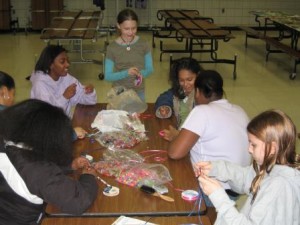- Calls to this hotline are currently being directed to Within Health, Fay or Eating Disorder Solutions
- Representatives are standing by 24/7 to help answer your questions
- All calls are confidential and HIPAA compliant
- There is no obligation or cost to call
- Eating Disorder Hope does not receive any commissions or fees dependent upon which provider you select
- Additional treatment providers are located on our directory or samhsa.gov
Girl Scout & Boy Scout Leaders: How to Approach a Family with Eating Disorder Concerns

Contributor: Margot Rittenhouse, M.S., writer for Eating Disorder Hope.
Broaching the topic of eating disorders can be a stressful and awkward experience, especially when approaching the family, but it is possible to do so successfully.
Be Respectful
Respect is crucial when having this conversation. Being a parent is rewarding but it is also difficult. Parents are constantly being watched, but they are still human, with their own struggles. There are many ways parents could not be seeing the warning signs of an eating disorder, but none of those involve them not caring about their children or being bad parents. Make no assumptions or accusations about their parenting abilities.
Sending the parents, the message that they may be at fault will create distance between you and them and work against solving the real problem. Instead, simply educate them on all of the risks that children and teens face related to eating disorders and make them aware of how to create a body-positive, safe environment for their children.
Planning a troop meeting with all children and their parents devoted to healthy eating habits and body image is an effective preventative measure that is informative without pointing out any individuals.
Support Them
 In addition to being respectful of the parents, be respectful of your troop member. The parents may be incredibly body-positive influences, yet a child can still find themselves struggling. Respect your troop member and talk to them about it before approaching their parents, letting them know that you are concerned and are there to support them if they want to talk.
In addition to being respectful of the parents, be respectful of your troop member. The parents may be incredibly body-positive influences, yet a child can still find themselves struggling. Respect your troop member and talk to them about it before approaching their parents, letting them know that you are concerned and are there to support them if they want to talk.
Eating disorders are often about gaining control, going straight to the child’s parents without first approaching them to gain their perspective will most likely only make them feel more alone and less in control.
It is equally important to approach the family as a team. This conversation is not about treating the parents or the child as the problem. Attempting to fight the problem while pointing fingers only works against solving the issue at hand and moving toward recovery.
The family will need to combat the problem as a cohesive unit, so set that example by focusing the conversation on the real problem, the eating disorder. Let the family know that you are there to work with them and to help in any way that you can.
Be Prepared
 Finally, prepare for the conversation by looking into books, websites, and community resources that might be helpful for a family dealing with disordered eating coming into their family. They may use these resources immediately or they may wait until they feel ready. The important thing is providing them with information, help, and support.
Finally, prepare for the conversation by looking into books, websites, and community resources that might be helpful for a family dealing with disordered eating coming into their family. They may use these resources immediately or they may wait until they feel ready. The important thing is providing them with information, help, and support.
Your job is to be a mentor to your troops and to work with their families to keep them safe and help them build skills to live healthy and happy lives. Approaching them with your eating disorder concerns may not result in them making changes or taking action immediately, however, it opens the door for the conversation, and that can make a huge difference.
Community Discussion – Share your thoughts here!
What resources have you utilized in order to learn and approach someone regarding an eating disorder?
 About the Author: Margot Rittenhouse is a therapist who is passionate about providing mental health support to all in need and has worked with clients with substance abuse issues, eating disorders, domestic violence victims and offenders, and severely mentally ill youth. As a freelance writer for Eating Disorder and Addiction Hope and a mentor with MentorConnect, Margot is a passionate eating disorder advocate, committed to de-stigmatizing these illnesses while showing support for those struggling through mentoring, writing, and volunteering. Margot has a Master’s of Science in Clinical Mental Health Counseling from Johns Hopkins University.
About the Author: Margot Rittenhouse is a therapist who is passionate about providing mental health support to all in need and has worked with clients with substance abuse issues, eating disorders, domestic violence victims and offenders, and severely mentally ill youth. As a freelance writer for Eating Disorder and Addiction Hope and a mentor with MentorConnect, Margot is a passionate eating disorder advocate, committed to de-stigmatizing these illnesses while showing support for those struggling through mentoring, writing, and volunteering. Margot has a Master’s of Science in Clinical Mental Health Counseling from Johns Hopkins University.
The opinions and views of our guest contributors are shared to provide a broad perspective of eating disorders. These are not necessarily the views of Eating Disorder Hope, but an effort to offer discussion of various issues by different concerned individuals.
We at Eating Disorder Hope understand that eating disorders result from a combination of environmental and genetic factors. If you or a loved one are suffering from an eating disorder, please know that there is hope for you, and seek immediate professional help.
Last Updated & Reviewed By: Jacquelyn Ekern, MS, LPC on April 4, 2016
Published on EatingDisorderHope.com

The EatingDisorderHope.com editorial team comprises experienced writers, editors, and medical reviewers specializing in eating disorders, treatment, and mental and behavioral health.

